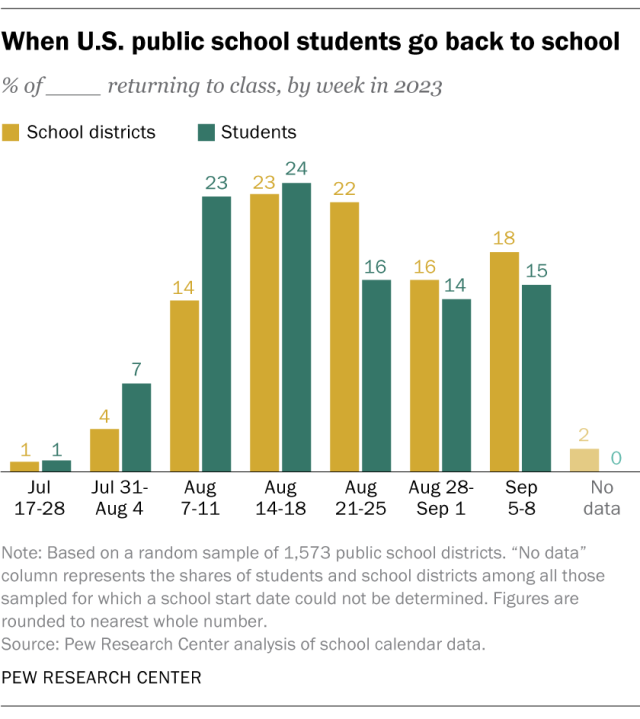On September 27, Mr. Michael Ben-David, our district’s new superintendent, came in to speak about profile writing with the Journalism class. By the time he’d left, however, he’d also managed to convince everyone in the room that starting the school year two weeks earlier would be in everyone’s best interest.
When he first presented the idea of starting school earlier, with a return to school in mid-August, we felt taken aback by the idea of our summer suddenly being cut short. However, the more he talked about the proposal of starting school early, the more intrigued we felt. Realizing that we would have more time to study for our AP exams and enjoy more breaks during the school year, we started to become more fascinated. By the time he left our class, we were convinced that we should investigate the idea of such a significant change.
Our current starting time isn’t very cohesive with the time frame of a THS student’s commitments. With Early Decision and Early Action college applications typically being due on November 1, the pressure to secure recommendation letters and assemble an application—in a mere two months—can be reasonably overwhelming. Starting in August would provide seniors with an opportunity to get a head start on approaching teachers for recommendations, and conferring with mentors on their application. The additional time could also help foster deeper relationships with teachers, in which students could demonstrate their growth and accomplishments more fully, resulting in a more compelling application.
Additional time for students to prepare for AP exams and SATs is another benefit of an earlier starting time. A few days or even a week of extra class time can make a difference in students’ test performances and decrease the amount of stress that can stem from taking these tests in a rushed manner.
Another reason that we believe starting school earlier would be beneficial is the fact that it would work well with fall extracurriculars. According to Ben-David, between fall sports and marching band, roughly 35% of students are on campus starting in mid-August. In addition to those students, the teachers who coach the programs must also be in school in mid-August. If all those people have to be at school in August, why not make the schedule the same for everyone? Sports in Tenafly end between the first and second week of June. So, if we were to start and end earlier, we could line up the academic and athletic calendars easily. Doing this would benefit all because it would mean that on summer recess, students would actually have a break from their fall sport/activity.
According to data analyzed by the Pew Research Center, the majority of districts in America go back to school between August 14-25th. This means that our start time in the first week of September is later than most schools.
And in addition to the benefits in test-taking and athletics, there are also more trivial advantages, such as better breaks. Who wouldn’t want to have a full-week break during the dreary February month? Well, this is something that an earlier school year could help accomplish. Students and staff feel exhausted and tired after having no breaks during this stressful and tiring month of the school year. Starting school earlier would also give the school a chance to put in extra days for breaks or to just end school earlier for people to have more vacation days in June. “If we would’ve done this for the 2024-2025 school year, you would be able to have a February break,” Ben-David said. “You could have your February break, or you could end earlier or you could have some split of the two.” Schools ending earlier not only means more of June off from school but also a head start on finding summer jobs. “If [Tenafly] High School gets out early and all the rest of the high schools get out late, that means you will get a jump on summer jobs with more options to choose from,” Ben-David said. “If [you] can start in early June, and someone else… can’t start until late June, they’d rather hire you than the other person.” For example, for a student trying to find a lifeguarding job in the summer, starting earlier gives an opportunity to get paid more and get better positions at the beginning of the summer.
Moreover, how much new learning are students really doing in June? We all know that school in June is prime movie-watching time, and no real work is getting done. Although we love the break June provides us at the end of a tough school year, there is no real benefit of it. For AP students, tests are taken in May; therefore, they would have over a month of movie-watching time, even though extra study time could be much more beneficial.
If there are so many advantages to starting school earlier, why do most schools in New Jersey start so late? New Jersey schools used to start later because the farming season usually takes place during the hot month of August and that time is needed for farmers to harvest their crops and get ready for the fall season. According to “New Jersey the Garden State,” an article published on Rutgers University’s Digital Highway, starting from the 1900s, New Jersey has shifted from an agricultural state to an industrial state, meaning that there is no reason for schools to not start in August. “It made sense when we were farming in the summer and harvesting crops,” Ben-David said. “It doesn’t make sense anymore. It’s a vestigial practice that is no longer is needed. The answer for why we’ve done it is because, well, that’s always how we’ve done it. But the singular focus of a school system should be in improving the student experience. Starting in August is just one of many simple, budget-neutral ways of accomplishing that mission.”

















































































































































